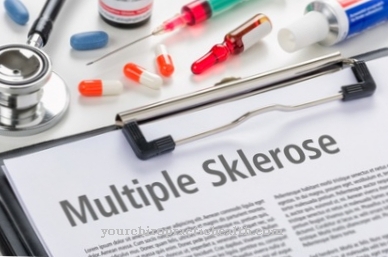Basiliximab is a drug from the class of immunosuppressants. It is used to prevent rejection reactions after liver or kidney transplants.
What is basiliximab?

Basiliximab is a medicinal product that belongs to the group of chimeric monoclonal antibodies. It was approved in the USA and the European Union in 1998. The antibodies are produced in a cell culture in mouse myeloma cells. Further components of the finished drug are:
- Sodium chloride
- Sucrose
- Mannitol
- Glycine
- water
- Sodium monohydrogen phosphate
Pharmacological effect
Basiliximab is used as an immunosuppressant, so it suppresses the reactions of the immune system. With basiliximab, the rejection of organ transplants is to be prevented. The drug should not increase the susceptibility to infections.
Basiliximab may only be administered in special centers that are technically and staffed so that they can adequately care for patients with hypersensitivity reactions to the drug. Overall, the tolerability of basiliximab can usually be rated as good.
Medical application & use
Basiliximab is an antibody. The antibody targets activated T cells. These are usually responsible for rejection of transplant organs. The immune system recognizes the transplanted organ as foreign and tries to destroy it with the help of the immune cells. The T cells form killer cells that migrate into the tissue of the organ and cause inflammation there.
Basiliximab blocks the so-called alpha subunit of the interleukin-2 receptor in T cells. The T-cell growth factor interleukin-2 normally binds to this receptor. Interleukin-2 stimulates the growth and differentiation of T cells. It also stimulates the production of interleukins, interferons, natural killer cells and macrophages. However, since basiliximab blocks the receptor, interleukin-2 cannot reach the T cells. This prevents the T cells from growing and multiplying. There is no immune reaction and the immune system is weakened. The graft rejection reaction is thus effectively stopped.
Usually basiliximab is given together with ciclosporin A and daclizumab. Like basiliximab, daclizumab blocks the interleukin-2 receptors. Ciclosporin also prevents the synthesis of new interleukin-2.
Basiliximab is used in adults and children to prevent acute transplant rejection after a kidney or liver transplant. In adults, the drug can be used in combination with azathioprine, mycophenolate mofetil, ciclosporin and corticosteroids for long-term treatment.
There are studies that confirm that basiliximab is also effective against the chronic inflammatory bowel disease ulcerative colitis. However, there is currently no approval for this indication.
As soon as it is known that the patient will receive a donor organ, basiliximab is used. Adults are given 20 milligrams intravenously two hours before the transplant. Another 20 milligrams are given four days after the transplant. Studies have shown that when basiliximab is added to standard immunosuppressive therapy, fewer transplant rejections occur.
You can find your medication here
➔ Medicines to strengthen the defense and immune systemRisks & side effects
The drug must not be used in the case of known hypersensitivity to an active ingredient of the drug. Basiliximab must also not be used during pregnancy and breastfeeding.
Basiliximab can cause many side effects. Very often there is pain or nausea. Rarely do patients suffer from rashes, sneezing, urticaria, respiratory tract spasms or wheezing.
Pulmonary edema can also develop when taking basiliximab. In pulmonary edema, fluid collects in the alveoli and in the connective tissue of the lungs. Typical symptoms of pulmonary edema are shallow breathing, restlessness, coughing, shortness of breath and blue skin. In later stages, patients also cough up frothy sputum. Pulmonary edema stresses the heart and must therefore be treated as soon as possible.
Other possible side effects are constipation, urinary tract infections, anemia, hypercholesterolemia, hyperkalemia and high blood pressure.
Cytokine release syndrome can occur in about 1 in 10,000 cases. A large number of cytokines are released from the T cells. This leads to fever, difficulty breathing, chills and skin rashes. The cytokine release syndrome can be fatal.
Although basiliximab is usually well tolerated, it may only be administered in special centers due to the possible serious side effects. Possible hypersensitivity reactions can be treated quickly and professionally here.
























.jpg)



